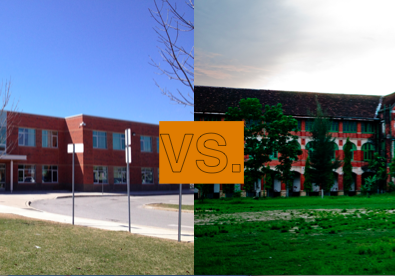Noah Cohen
Community Editor
Growing up as a kid in LA, I spent a lot of time listening to adults talk about their favorite subject: their children. More often than not, this conversation revolved around the schools that their children attended. This may seem like a common occurrence to someone who grew up in the world of interviews and applications for primary education, but to people in states like North Dakota, this is a very foreign process. There, less than 9% of all students attend a private school. That means for the vast majority of students in the state, the local public school is where they are expected to attend. This case is true for states such as Montana, Maine, Vermont, and Colorado to name a few. They all have under a 10% private school enrollment rate. With this information, it is safe to assume that the vast majority of people in those states choose to send their children to public school rather than private school.
Since 1635, the United States has been offering free education for our nation’s children. The public school system was established to ensure that every child has the right to an education, with the overall intent to promote individual success. Nowadays, private schools, especially in Los Angeles, have become a booming business of competitive education. I have personally attended many different types of schools, including private secular school, public school, private Catholic school, and, finally, private Jewish school. As a person who has experienced all these different types of school systems, I am often asked, “What kind of school I feel is best?” The question boils down to whether private or public school is better for a child’s education and development overall. While, admittedly, the basis for this debate is rooted in opinion, there are many statistics* that pertain to this one burning question. Prepare yourself, because it’s time for a Milken Roar Debate: Public vs. Private School.
*Note: All statistics in this article have been provided by the Education Action Group Foundation and the National Center for Education Statistics, unless stated otherwise.
The Case for Public School: In the United States, as in many other countries, education is a free right, not a privilege. Every child enrolled in public school is required to be taught the same information that the federal government has deemed important to their lives and overall success. This is commonly known as “Common Core” learning. Proponents of public education have deemed the private school system a scheme by the upper class to turn education into a mutli-million dollar business.. It is important to note for the private school education that children receive is not monitored by the government, and therefore may give these kids an unfair disadvantage upon entering the university system. There is key information that they might not be taught in an unsupervised private school, that is taught in the government-formulated school plan. The website GreatSchool.org, which offers articles and information on comparative schooling, says that “it’s important to note that all teachers in a public school are usually state certified or, at a minimum, working toward certification. Certification ensures that a teacher has gone through the training required by the state, which includes student teaching and course work. Teachers in private schools may not be required to have certification”. The government ensures that the teachers are qualified to teach our children, while private schools do not take the necessary measures to ensure the credibility of a teacher’s teaching ability. In order for children to receive an education that will prepare them for the future, they must enroll in public school.
The Case for Private School: Public Schools are failing our children and are part of an outdated system that cannot live up to the standard of learning that paying for private school can give. Private school students learn critical thinking and analysis, instead of being force fed facts. This is because private schools are not restrained by the government to teach kids to the standard of the lowest common denominator (lowest scoring students) in the country. The public school system was designed to make competent workers for the government. It is outdated and ineffective towards generating success. Private school students are independent thinkers that will be more successful in the world. Without “big government” intervening in our day-to-day activities, private schools have the freedom to teach children what they need to know, the way that we want them to learn it. Yes, many private schools are quite expensive, but for those families who can afford to send their children to a private school, it is their obligation to send their children to an institution where they will receive the best education available. With a graduation rate of 92%, private school is a near guarantee for students to receive a high school diploma. This will ultimately lead to a happy and stable job, which is part of a successful and fulfilling life.
What is your opinion on this debate? Should students have a mandated curriculum nationwide, or should each school choose what is important to be taught to students? Are private schools worth the tuition money? Let us know in the comments!



